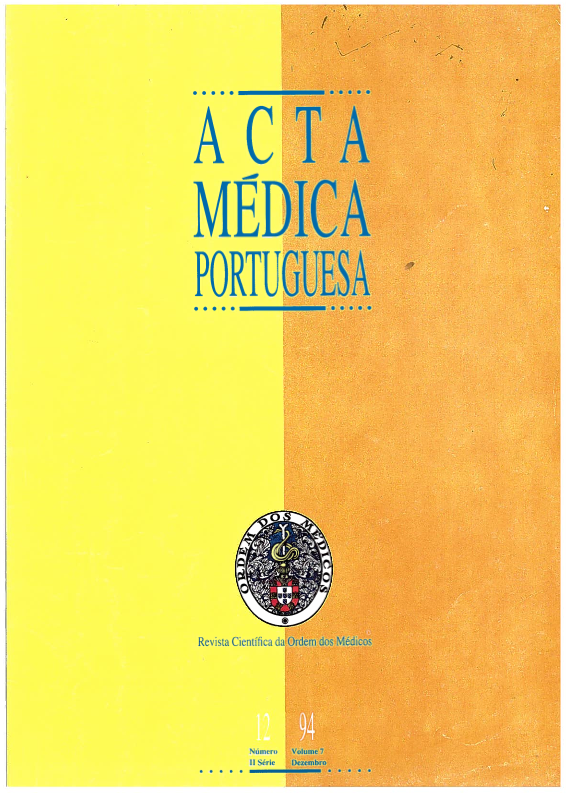Terapêutica da Leucemia promielocítica aguda com ácido Trans-Retinóico. Experiência do Hospital de Santa Maria, Faculdade de Medicina de Lisboa.
DOI:
https://doi.org/10.20344/amp.3014Resumo
Acute promyelocytic leukemia (APL) is a rare subtype of acute myelogenous leukemia that is usually associated with a fatal hemorrhagic diathesis. All trans-retinoic acid (ATRA) is an active metabolite of vitamin A that differentiates the malignant cell clone, corrects the coagulopathy, and induces complete remission in the vast majority of patients with APL. Between June 1992 and September 1993, 8 patients with APL (4 previously untreated, 3 in first relapse and 1 in second relapse) received ATRA. Complete remission was achieved in 7 patients; in 5 with ATRA alone and in 2 with ATRA followed by cytotoxic chemotherapy due to the development of asymptomatic hyperleukocytosis. The earliest signs of response were the correction of the coagulopathy and an increase in the white blood cell count. Sequential morphological and immunophenotypical analyses of the bone marrow revealed differentiation of the malignant cell clone, in the absence of bone marrow hypoplasia. 4 of 5 patients treated only with ATRA until complete remission had late leukopenia. The most frequent adverse effects were dryness of skin and mucosae, hypertrigliceridemia and hypercholesterolemia, and a moderate increase in liver transaminases. An increase in the white blood cell count was common, and in two cases exceeded 35.0 x 10(9)/l. One of these patients developed multiple thrombosis of the extremities after cytotoxic chemotherapy. We frequently observed an increase in lactic dehydrogenase levels that was concomitant with the peak in the white blood cell count. The only patient on whom complete remission was not achieved was 60 years old, had chronic obstructive pulmonary disease, and died in the third week of therapy with a pulmonary distress syndrome.(ABSTRACT TRUNCATED AT 250 WORDS)Downloads
Downloads
Como Citar
Edição
Secção
Licença
Todos os artigos publicados na AMP são de acesso aberto e cumprem os requisitos das agências de financiamento ou instituições académicas. Relativamente à utilização por terceiros a AMP rege-se pelos termos da licença Creative Commons ‘Atribuição – Uso Não-Comercial – (CC-BY-NC)’.
É da responsabilidade do autor obter permissão para reproduzir figuras, tabelas, etc., de outras publicações. Após a aceitação de um artigo, os autores serão convidados a preencher uma “Declaração de Responsabilidade Autoral e Partilha de Direitos de Autor “(http://www.actamedicaportuguesa.com/info/AMP-NormasPublicacao.pdf) e a “Declaração de Potenciais Conflitos de Interesse” (http://www.icmje.org/conflicts-of-interest) do ICMJE. Será enviado um e-mail ao autor correspondente, confirmando a receção do manuscrito.
Após a publicação, os autores ficam autorizados a disponibilizar os seus artigos em repositórios das suas instituições de origem, desde que mencionem sempre onde foram publicados e de acordo com a licença Creative Commons









